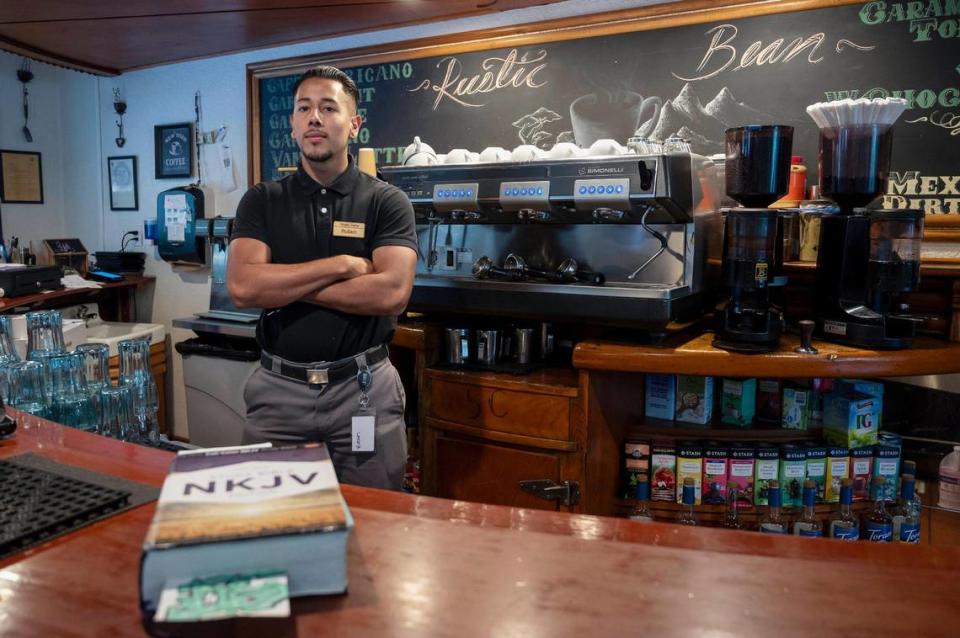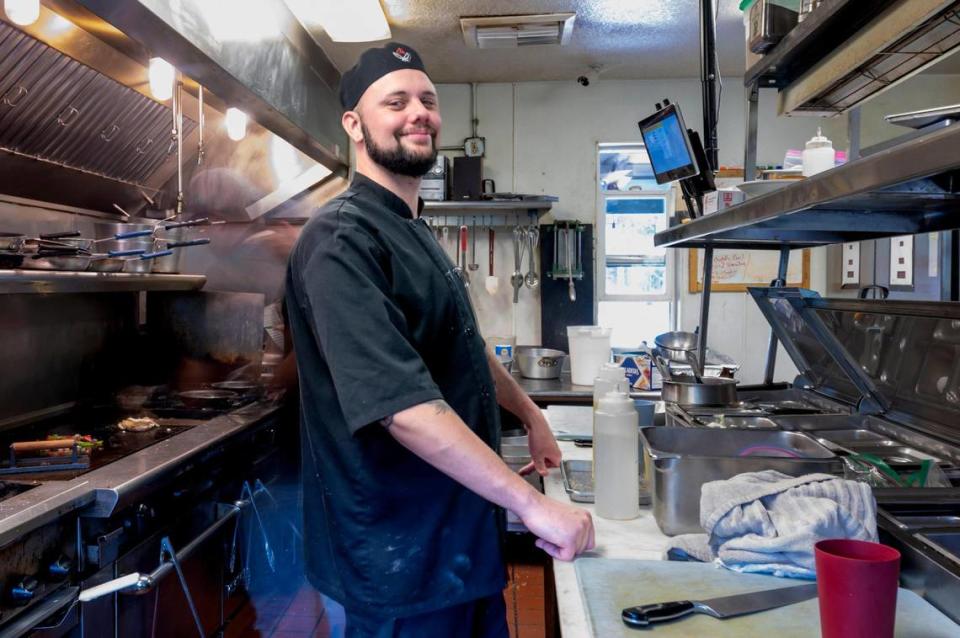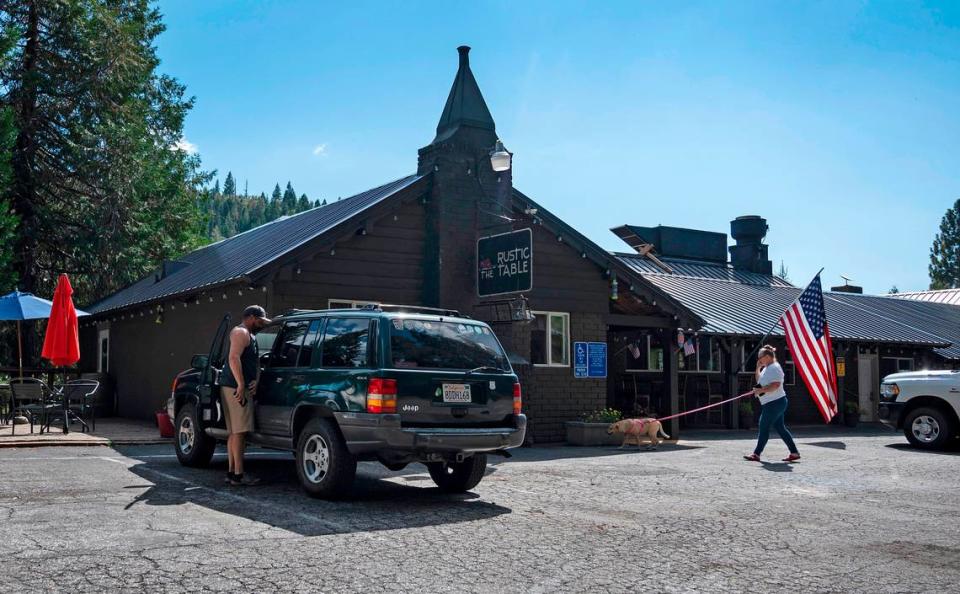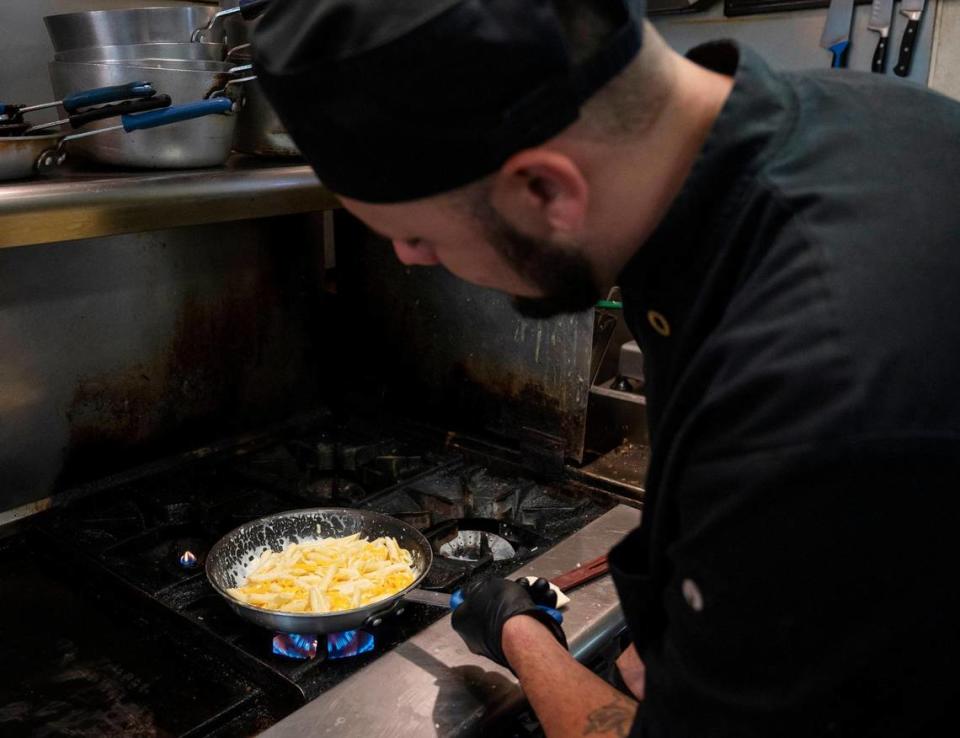Burgers but no beers: Emigrant Gap restaurant is connected to drug-alcohol recovery program
It was a few minutes before the start of chapel service on a recent morning at one of the Sacramento region’s most unconventional restaurants.
Ruben Ramirez, a 23-year-old man from the Gilroy area who used to be homeless due to OxyContin and fentanyl, was practicing worship songs on a piano he didn’t know how to play a year ago.
So it goes at The Rustic Table. At first glance, this is an affordable, family-style eatery off Interstate 80 in Emigrant Gap. But the workers don’t hide that there’s a deeper story beyond brisket mac & cheese or half-pound burgers. This restaurant is also part of a faith-based recovery program, Sierra-Pacific Teen Challenge.
A turquoise-tinged painting of Jesus hangs next to a restroom. Workers at the restaurant – who can include everyone from men who have just arrived and are early in their recovery to full-time staff who’ve graduated — have been seen praying with customers at the bar, a holdover from the building’s days as a dive bar.
There is, of course, no alcohol on the menu now; a robust selection of Italian soda is offered instead.
Drug and alcohol recovery can sometimes mean one of two things: either having resources to pay for rehab; or taking whatever programs like Teen Challenge might be available. Programs like this are sometimes not without controversy. But at least for men like Ramirez, they seem to be making a difference.
Watching the transformation
At some point in the last year, Ramirez sat down at The Rustic Table’s piano, which is in a corner of the restaurant near a door leading to the patio. He had a sheet telling him which chords were which.
“I put a song next to it and then just learned one hand with the chord,” Ramirez said. “Then I started getting better at finger placement. And then later on, I asked someone how to do an octave and then pieced it together. Just sat there and then learned one song completely to where I could sing it.”
It was just the latest change for Ramirez, a soft-spoken man with short-cropped hair and roughly two years, four months sober. He never sang before this, either, at least not anywhere beyond the shower, he joked.

Ramirez came into Teen Challenge at 20 years old, after struggling with drugs, a codependent relationship and homelessness. Even though his life had reached an extreme low, Ramirez still struggled to find initial willingness to stick with the program.
When men and women first come to Teen Challenge, they typically start by going to a special crisis facility to detox. After a period of time in crisis, they can be placed at locations like The Rustic Table, for a program that lasts a minimum of 13 months but can be however long a person needs.
While in the crisis phase at a Watsonville facility, Ramirez had to go to the hospital. Upon his release, Ramirez couldn’t remember where the crisis facility was and the hospital instead dropped him at a random church. Ramirez called his father, who told him either he’d return to the program or his family would drop him back at the park.
“We’re planning for your funeral,” Ramirez remembered his father telling him. “By this time next week, you’re not going to be alive if you keep going on your addiction.”
Ramirez chose to go back to the program. He has now graduated from it and is a staff intern at Sierra-Pacific Teen Challenge.
Jose Marin, a 41-year-old Teen Challenge alum who works full-time at the Emigrant Gap center provided figures to the Sacramento Bee showing that overall, the program currently has 11 students as well as four full-time staffers and two interns who’d graduated and opted to stay on.
The Rustic Table, which dates to 2012 in Emigrant Gap, is in Sierra Woods Lodge, a hotel also part of Sierra-Pacific Teen Challenge. Program participants live in a dorm underneath the hotel and can work various tasks on-site. The men are trained in maintenance, grounds, housekeeping, lobby and restaurant work, per Marin.

The center also sometimes gets travelers from other Teen Challenge locations, such as Christian Tapia, a 40-year-old from Susanville who is recovering from methamphetamine use and has been at Teen Challenge for about 14 months. He was visiting the Emigrant Gap chapel service from a Monterey-area center.
Tapia said he decided to join Teen Challenge while he was in jail. Now, Tapia was preparing to do handywork at a Christian camp for the program.
“If you look at his rap sheet … no one should give him a chance,” Mike Borden, executive director for Teen Challenge Monterey Bay said of Tapia during the chapel service. “But as people who have been forgiven, we should forgive others.”
Tapia said he was excited about the opportunity at the camp. “It’s just something God has opened a door for me.”
Granted, not every story is as smooth.
Hitting the road
The Rustic Table is, to put it mildly, remote.
The road the restaurant is located on is technically the remains of U.S. 40, one of the first highways in the country. Buses run infrequently to the tiny town of Emigrant Gap, which has about 80 residents, according to the census. Still, this doesn’t stop program participants who’ve had enough of The Rustic Table from striking out on their own.

“You go to their bunk areas and they leave everything,” Marin said. “They just get a little backpack. And they walk.”
Marin recounted the story of one man now back in the program following a wild sojourn. After bolting one morning, the man walked down the road through Emigrant Gap, eventually getting lost and spending the night outdoors. This isn’t the safest course of action, with bears regularly spotted on security cameras in Emigrant Gap, according to community Signal posts.
After a night in the wilderness, the man decided to trek back to The Rustic Table, following Interstate 80. Marin, who commutes from Foresthill, spotted the man walking east on the highway near Nyack, a couple miles from Emigrant Gap.
“He was so stoked to see me,” Marin said. “He got in and he was thirsty and he was just ready — ready to come back.”
Succeeding in a program like Teen Challenge can mean getting to a point of being willing to do whatever it takes to get through. It can also mean embracing or at least tolerating the condemnation of homosexuality. At chapel service, Borden quoted a Bible verse, 1 Corinthians 6:9-20, that includes homosexuals among groups who will not inherit God’s kingdom.
“God has called us to a higher standard and it’s not the standard of the world,” Borden said.
Sticking with the program
Teen Challenge hasn’t been without controversy at times, with Rachel Aviv questioning in a 2021 piece for The New Yorker if some of the program’s practices hewed closer to abuse than discipline. It isn’t hard to find online groups condemning Teen Challenge, similar to the criticism Alcoholics Anonymous sometimes attracts.
That said, Teen Challenge has its local supporters, such as Roseville City Councilman Scott Alvord, who is open about his faith as a Seventh Day Adventist. Alvord wasn’t familiar with The Rustic Table but said he’d attended a Teen Challenge event in Roseville in recent years.
“I remember the stories and the people who have gone through the program, how society pretty much rejected them,” Alvord said. “And this was an opportunity for them to get clean and turn their life around and was their last hope for many of them.”
He added, “I think we need more opportunities to get people off of drugs, because that’s an issue it’s just hard for the community to deal with.”
These opportunities have gotten scarcer in the region in recent years, with Salvation Army closing its adult recovery center in Sacramento. “I think most counties are going to say that they would benefit from additional treatment providers and additional capacity for residential placement,” said Scott Genschmer, a program manager for Placer County.
Amy Ellis, the director of behavioral health for Placer County said that the county doesn’t ever send people to Teen Challenge, since it doesn’t contract with the program. But the county includes Teen Challenge on a list of resources people can access for addiction services.
“I would describe it more like an alternative option for individuals who would prefer something different than what we have to offer,” Ellis said.

One major point in Teen Challenge’s favor could be its success rates. Borden said that of the people who complete the program, after five years, around 80% to 90% remain productive members of society, active in their churches and clean and sober. Small relapses don’t remove them from this number.
“It doesn’t mean that they actually led a perfect life along the way, but have the near-perfect life and (are) able to maintain it,” Borden said.
Ramirez once hoped before getting clean to join a gang. He now sees himself being a long-term staff member for Teen Challenge and is also interested in one day going to school to become a youth minister. He holds fast to the program’s statistics.
“It’s been proven that this place works,” Ramirez said. “It’s not just the place, it’s the people.”

